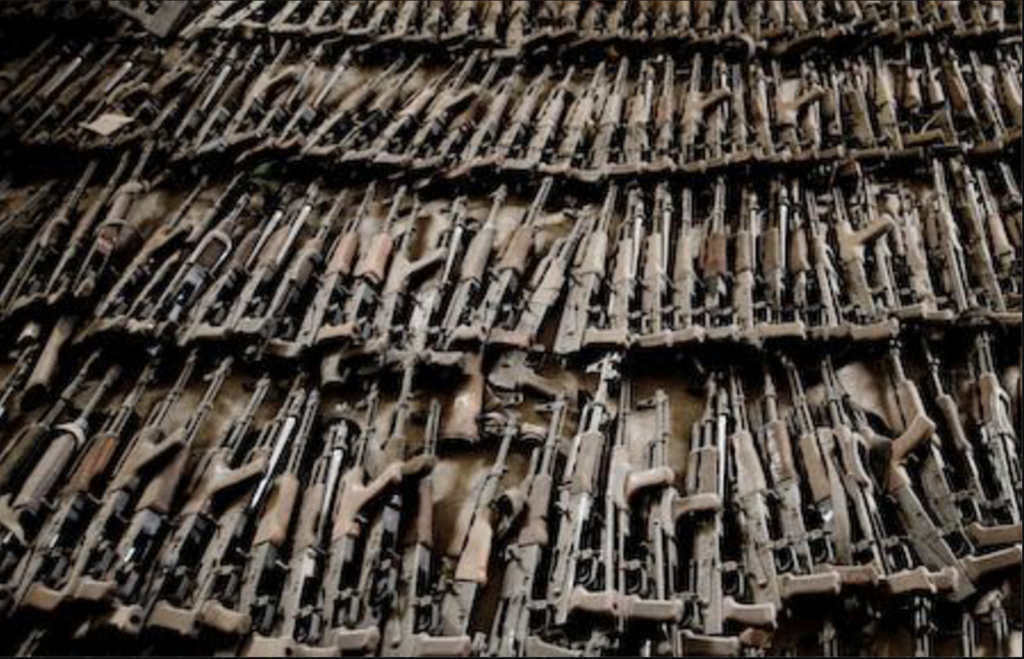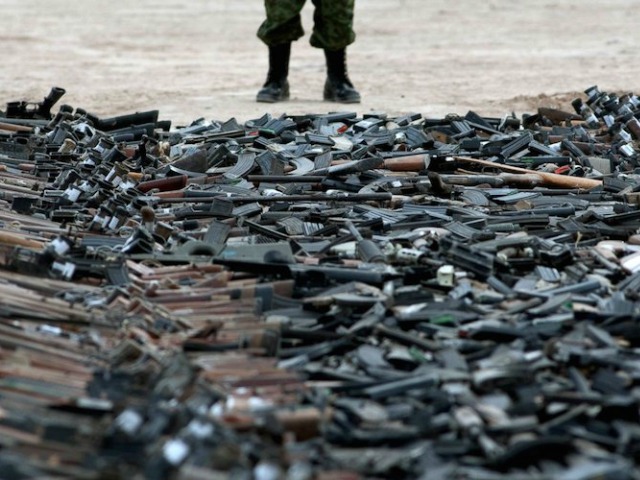
Despite widely documented diversion of weapons to the battlefields of Syria and Yemen, Balkan exporters continue to reap profits from the lucrative trade.
Despite widely documented diversion of weapons to the battlefields of Syria and Yemen, Balkan exporters continue to reap profits from the lucrative trade.
In January 2017, a joint delegation of trade officials from Bosnia and Serbia visited Saudi Arabia to form a trilateral committee dedicated to promoting trade between the countries. Alongside tourism and investment, Balkan officials discussed bolstering the increasingly lucrative sale of weapons and military equipment to the Gulf country.
Barely two weeks before the meeting took place, Saudi-led warplanes targeted an elementary school near the Yemeni capital, Sanaa, killing at least eight school children. A few days earlier, another coalition airstrike on the outskirts of the city killed 12 people.
However, Saudi Arabia’s ongoing military campaign in Yemen and questions of complicity in war crimes did not make the top of agenda during Bosnia and Serbia’s meeting in Riyadh. Instead, Balkan officials focused on negotiating an uninterrupted cash flow from their sale of weapons, some of which are believed to be illegally diverted to the Middle Eastern battlefields, including Yemen and Syria.
The extent of the Balkan arms trade and the suspected diversion of the equipment were uncovered in 2016, following an investigation by the Balkan Investigative Reporting Network (BIRN) and the Organized Crime and Corruption Reporting Project (OCCRP). It was revealed that, since 2012, eight eastern European and Balkan countries (Bosnia, Bulgaria, Croatia, the Czech Republic, Montenegro, Romania, Serbia and Slovakia) approved the shipment of weapons and ammunition worth at least €1.2billion to Saudi Arabia, Jordan, United Arab Emirates and Turkey. The biggest chunk, worth €806million, was received by Saudi Arabia.
While the sale of weapons to the above countries is not illegal, there is evidence that some of the equipment ends up being diverted to Syria and Yemen by the purchasing countries, where it is used to fuel the ongoing conflicts. Under the UN Arms Trade Treaty, signed by the Balkan countries, such transfers are illegal.
Although exporting countries are obliged to conduct due diligence to minimize the risk of arms diversion, there is little evidence to suggest that Balkan authorities carry out comprehensive assessments beyond relying on end user certificates and other basic checks. Turning a blind eye to potential abuses contravenes a host of European Union and other international regulations, and it could hamper Bosnia, Serbia, and Montenegro’s EU accession efforts.
In addition to being diverted from state-brokered deals, Balkan-made weapons have also found their way to the Middle East after being smuggled out of the region by criminal networks.

Following the Yugoslav wars, Balkan governments have struggled to manage the high numbers of illegal weapons held by private citizens. Although there are no official statistics, it is estimated that 750,000 unregistered firearms remain in Bosnia, a country that has a population of 4 million. The leftover weapons not only pose an internal security risk; they have also been smuggled out of the country and used in terrorist attacks in Europe, or transferred to the Middle East by criminal syndicates.
According to Amnesty International, some of the Yugoslav-era munitions have also ended up in the hands of ISIS after the militant group invaded Iraqi army barracks and confiscated their contents. The arms had been exported to the UK in 2005 and 2006 and then re-exported to Iraq. A report by Armament Research Services in 2015 found that 17% of ammunition used by ISIS in Iraq came from the Balkans.
Although Balkan authorities might have limited control of the illicit trade in arms smuggled out of the region by criminal networks, they have a significant role to play in minimizing the risk of their military equipment being used to fuel foreign conflicts.
In February 2015, Bosnia banned the sale of arms and ammunition to Ukraine, claiming it was not in Bosnia’s “foreign policy interest at this moment”. The Bosnian Presidency noted in its statement that the arms exports “do not contribute to regional security, stability and ongoing international diplomatic efforts to broker a peaceful solution to the crisis in Ukraine”. Following the ban, Unis Group, a Bosnian arms producer that secured a €5 million deal to supply military equipment to the war-ravaged eastern European country, filed a lawsuit against the Bosnian government for interfering with their business.
The ban followed the resignation of Boris Tucic, a minister of external trade and economic relations, who claimed Bosnia should not supply arms to Ukraine. The decision by the central government to halt the exports came after pressure from Bosnian Serbs, who traditionally maintain links with Russia, a party to the conflict in Ukraine. Milorad Dodik, the president of Republika Srpska, remarked at the time that “”Russia has said clearly what it thinks about those deliveries, and that it would not be good for Bosnia, that is, the RS, to take part in it.”
At the same time as it banned exports to Ukraine, Bosnia stepped up the sale of arms to other countries. According to Bosnian Foreign Trade Chamber, local arms producers registered a 15-20% increase in profits in 2016 compared to the year before, with the total value of exports rising from €70 million to €87.4 million. The main recipients of Bosnian weapons in 2016 were Egypt and Saudi Arabia.
By continuing to supply arms to countries accused of diverting them to war zones while blocking others based on current geopolitical interests, the Balkan countries expose themselves to charges of double standards and overlooking human rights violations in pursuit of profit. Turning a blind eye to potential abuses also poses a moral dilemma for states that came out of bloody civil conflicts only two decades ago and still struggle with their own state-building efforts.






